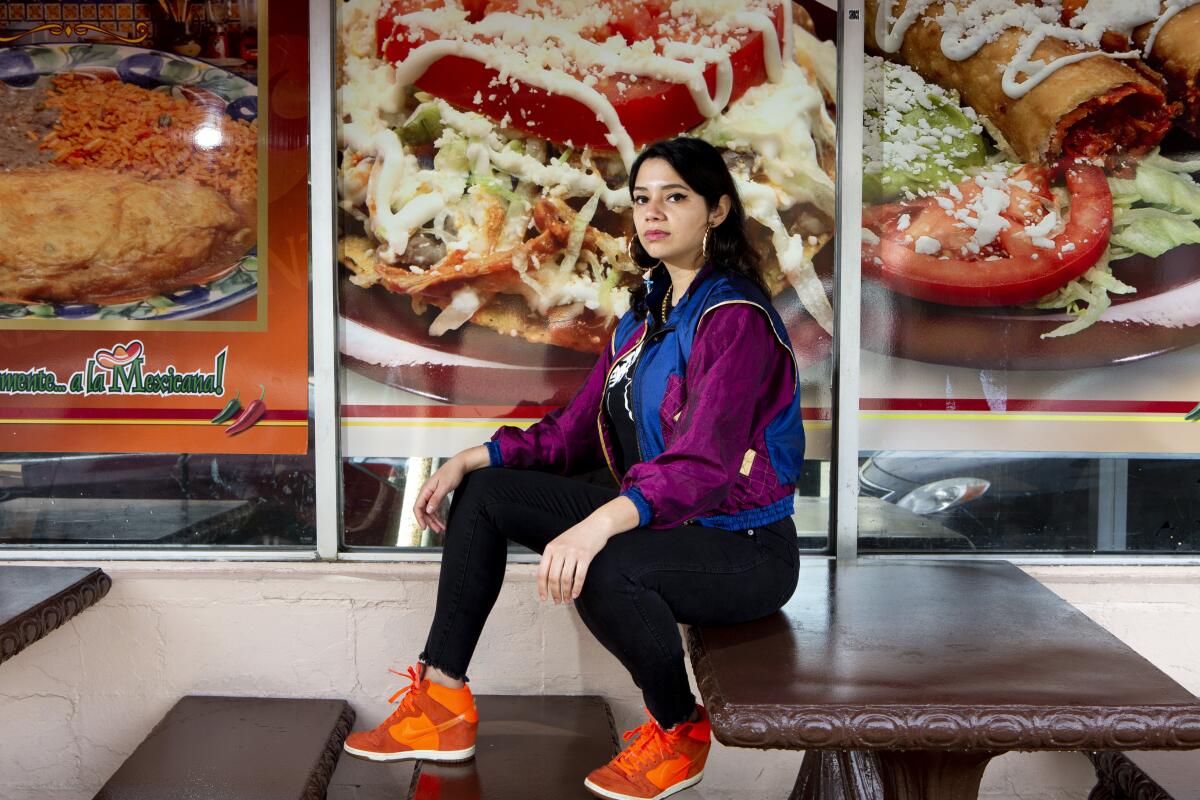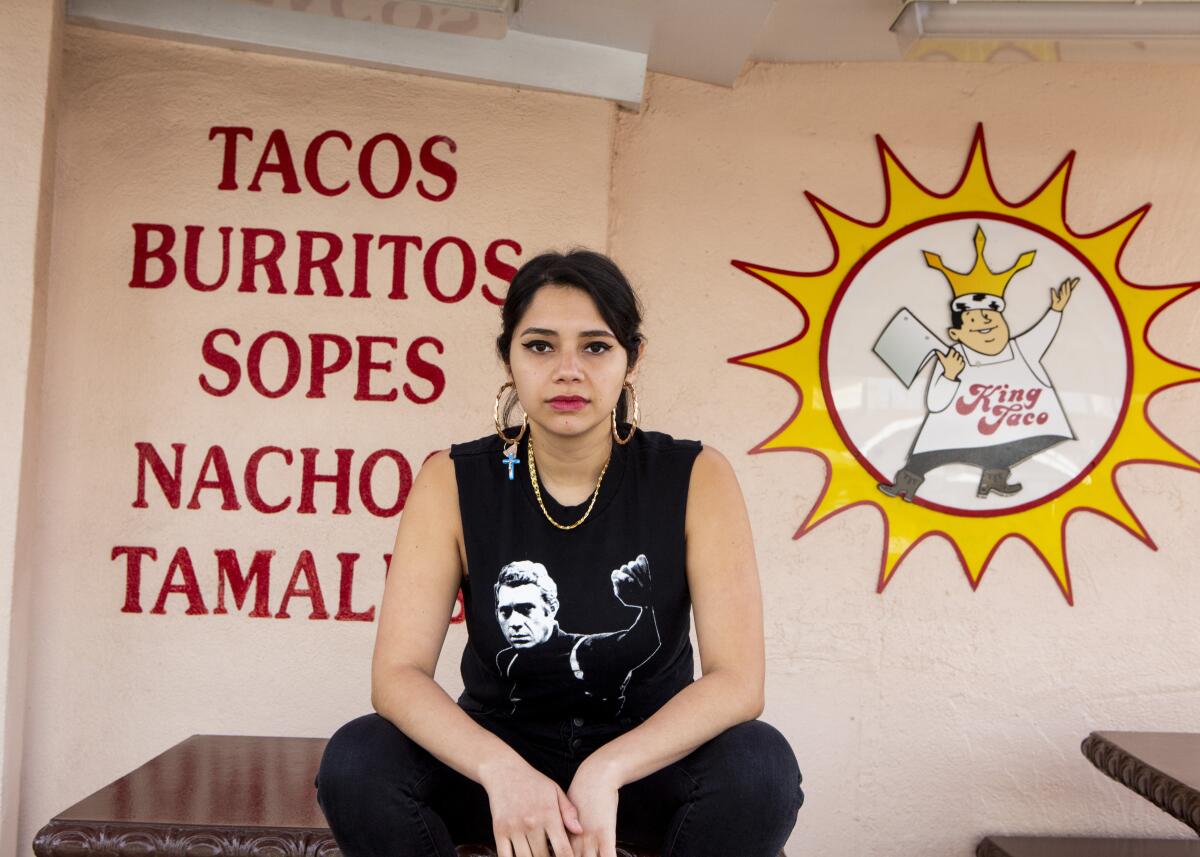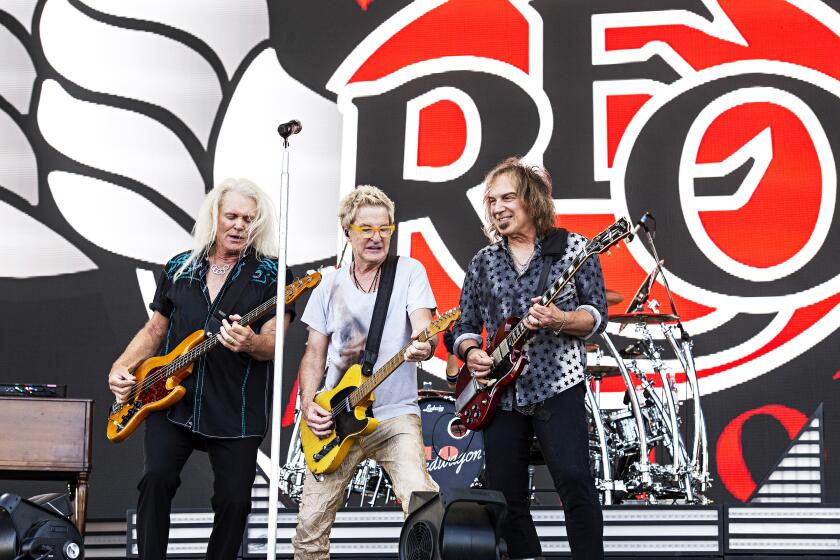East L.A. native (and Obama favorite) Angelica Garcia ‘leans into her identity’ on defiant new album

When Angelica Garcia got the news that America’s only widely respected music critic — Barack Obama — had selected her single “Jícama” as one of his favorites of 2019, she first thought something much worse had happened.
“My phone kept going off and people were texting, ‘Oh my God, I’m crying.’ I thought, ‘What happened? Who died?’ My hands were shaking.”
For Garcia, a 26-year-old former Angeleno now at the vanguard of experimental Latin rock, praise from the former president was the one thing that would impress her family.
“My grandma has a piano in the living room that’s adorned with pictures,” she said. “I thought this was especially funny, because up there it’s just all pictures of saints and Obama, and none of her grandchildren.”

That’s an honor that fits right in with her new album, “Cha Cha Palace,” out Friday, about reasserting her Latin culture, reinventing herself as an independent artist and conjuring memories of L.A. from the other side of the country.
At a table outside King Taco in Cypress Park, Garcia reminisced about her childhood here. (She’d come back to L.A. for a songwriters’ workshop to soundtrack the Starz show “Vida,” about a pair of sisters returning to their East L.A. neighborhood). Born to a Mexican/Salvadoran family in the San Gabriel Valley, Garcia’s upbringing had L.A.’s Latin culture as a default, with all the family, music, food and easy bilingualism that comes with it. She moved to the tiny town of Accomac, Va., as a teenager to follow her parents as her stepdad, a minister, took a position at a church there. She moved on her own to nearby Richmond a few years later.
The change was a shock, and while she found a new community of ambitious indie musicians in the heart of the old Confederacy, there were parts of herself that went unseen there.
“As I got older, I really felt the lack of cultural connection and even things like hearing Spanish every day. I got a job at a Cuban diner in Richmond ‘cause I was like, OK, I need something,” she joked. “I love Richmond and I love the community there. But I also just felt increasingly like, when I’m singing these songs, do people even get what I’m talking about? Do people even get me?
“That really made me want to lean more into my identity,” she added. “I shouldn’t feel like I have to conform just because people don’t always know what I’m talking about.”

Her 2016 Warner Bros. debut, “Medicine for Birds,” was widely praised, but its pristine Americana had little to do with those questions she’d begun asking about identity and inheritance. After she was dropped from Warner, she felt a bit adrift but began writing the demos that became “Cha Cha Palace.” Increasingly, the tracks evoked the Los Angeles of her memory — a messy, thrilling, frustrating collision of the past and future. But most important, it was a city where people just got it.
“I feel like it was such a blessing and a privilege to grow up in Los Angeles and to have Latinx culture everywhere. I miss that,” she said. “It’s not just about missing tacos, it’s about the acceptance and it’s about the understanding that is immediate versus having to prove it.
“A lot of my songs on this album are coming from trying to preserve the Los Angeles that I grew up in. It’s kind of like putting together pieces of my memory of Los Angeles and asking my friends in Richmond to help me tell this story.”

The end result is an absolute riot of genres, ideas and hard turns across the entirety of Latin music. From the distortion-cracked howls and groovy ostinatos of “Karma the Knife” to the strafing runs of choppy vocal samples on “Guadalupe” (an ode to the teenage girl behind all the murals and pilgrimages in Latin Catholicism), the album hits like those L.A. moments where the soundtracks of three different backyard barbecues converge on a blistering street corner.
She found a worthy collaborator in Eddie Prendergast, a Richmond-based producer and veteran salsa band member who, despite being a self-described “gringo,” had instincts for the kind of Latin swing and modern noise that Garcia was hunting for. He produced the album for the influential Richmond indie label Spacebomb, along with engineer Russell Lacy.
“She first had me play bass on the song ‘Karma the Knife,’ and I thought, ‘This feels like M.I.A. to me,” he said, referencing the avant-garde U.K. pop artist. “We were trying to make the tracks hot, but the message resonates.”

He’s seen several eras of the U.S. record industry flirting with Latin pop, and is quick to emphasize that for Latin America and in much of the U.S., these sounds have always been enormously popular.
But in a time when acts like Bad Bunny and J Balvin headline Coachella and tracks in Spanish hit No. 1 on U.S. streaming without much fuss, the music is clearly resonating on its own terms and opening up to more challenging acts.
Latin music is “such a broad term,” Garcia said. “It covers so many things, so many genres, so many types of people, so many countries. But it seems like ears are open and the world is kind of paying attention now.”
“Cha Cha Palace” has a couple of statement pieces. The first is “Jícama,” and it’s easy to see why Obama found it emblematic. Its buoyant chants and Art Laboe-oldies guitars are immediately hooky, but there’s a defiant streak underneath: “I see you but you don’t see me, nah / ¡Jícama! ¡Jícama! Guava tree … Born of the bones from under East L.A. / Cultura Chicana is alive today / I want some freedom with my pan dulce.”

But the other might be her cover of Jose Alfredo Jimenez’s “La Enorme Distancia,” a giant of Mexican ranchera music. The track has a cameo from her grandmother, and it serves as a direct link to that past she longed for in Richmond.
“Her memory doesn’t work the way that it used to. So when I handed her a microphone, it really touched me that that’s the first song she started singing,” Garcia said. “It’s about a great distance and how it doesn’t matter that we’re far, we’re still close in spirit. That made me cry when she started singing that, because her memory is gone, but she remembers lyrics.”
As Garcia embarks on the next chapter of her career, she’s growing more outspoken about the border crisis and the creeping resurgence of anti-Latin sentiment in much of America. The racial terror of the past is never too far away in a city like Richmond, once the capital of the secessionist slave-holding states that attacked the U.S. (“The world’s largest collection of second-place trophies,” Garcia said, witheringly referring to the Confederate monuments that still scar the South.) But it’s not like L.A. is immune from that tension either, and Garcia wants to speak to it.
Music may feel sort of futile in the face of a Border Patrol agent getting off consequence-free for shooting a Mexican teen in his own country. But “Cha Cha Palace,” in its way, is a deeply American record — about longing for somewhere distant, finding a new home where you are and standing up when dark tides threaten it.
“I guess what I’m trying to do in the world is just, like, to do my best in my corner. Artists have the gift of a platform,” she said. “I feel everything. So I personally feel a responsibility to say OK, this is [screwed] up.”
More to Read
The biggest entertainment stories
Get our big stories about Hollywood, film, television, music, arts, culture and more right in your inbox as soon as they publish.
You may occasionally receive promotional content from the Los Angeles Times.











